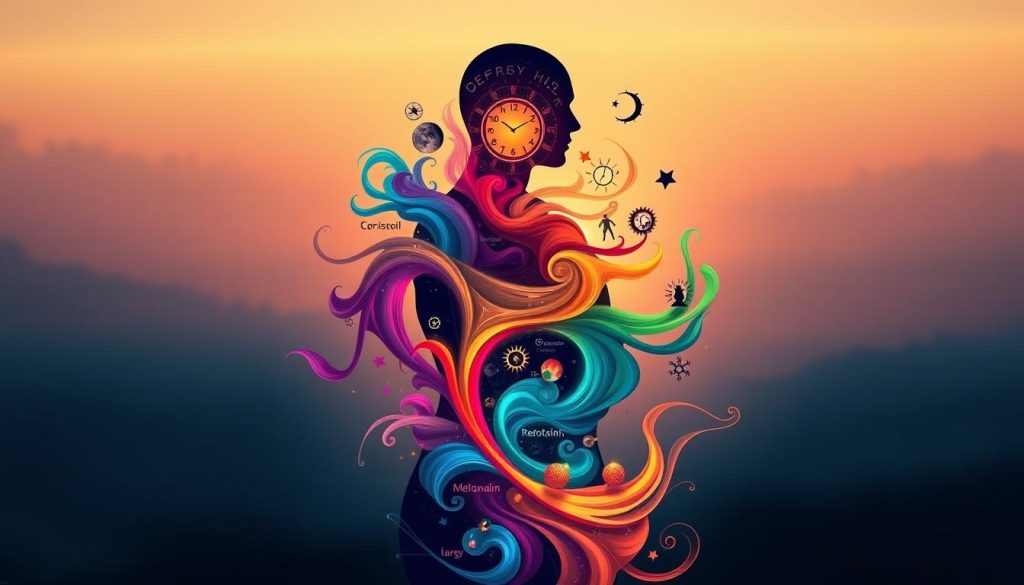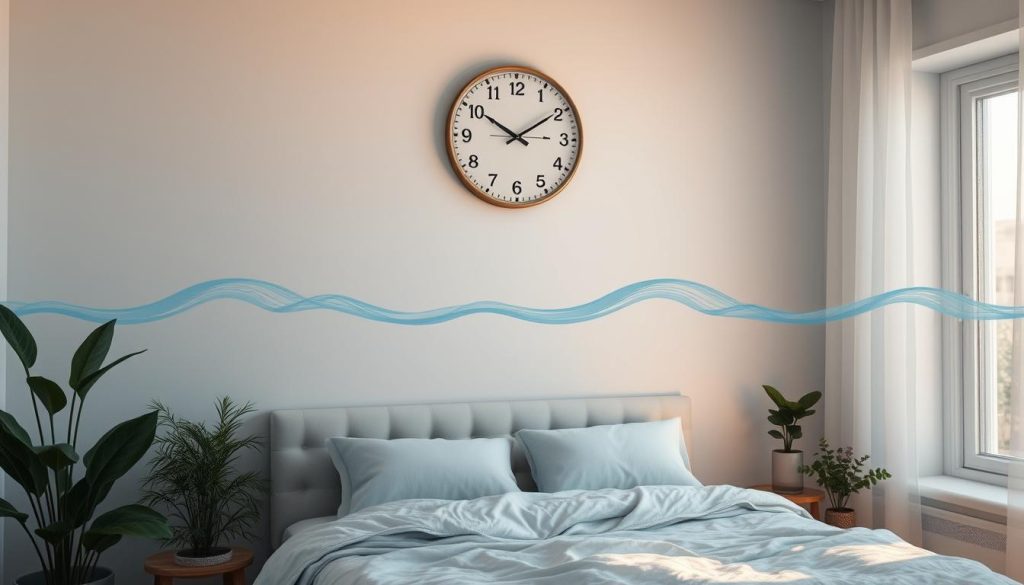In our fast-paced world, it’s easy to forget our body’s natural rhythms. These internal clocks, or circadian rhythms, affect our daily lives. They influence our sleep, hormones, and more. Let’s dive into the world of the body clock and find ways to improve our health and well-being.
The Essence of Our Body Clock
Our body clock, also known as the circadian rhythm, is a fascinating internal mechanism. It regulates various physiological processes in our bodies. This biological clock controls our sleep-wake patterns, hormone release, body temperature, and more. Understanding our body clock is key to maintaining our health and well-being.
What is the Body Clock?
The body clock is a complex system that syncs our internal processes with the 24-hour day-night cycle. It is driven by a small region in the brain called the suprachiasmatic nucleus (SCN). This internal clock coordinates the rhythmic activity of various organs, tissues, and cells. It ensures they function in harmony with one another.
Why is it Important?
The body clock is very important. It governs many aspects of our lives, including:
- Sleep-wake cycles: The body clock regulates our sleep-wake patterns, ensuring we feel alert during the day and sleepy at night.
- Hormone regulation: The release of hormones, such as melatonin and cortisol, is tightly controlled by the body clock. It influences our mood, energy levels, and overall well-being.
- Body temperature: Our body temperature follows a circadian rhythm, dipping at night and rising in the morning. This is crucial for optimal physiological function.
- Digestion and metabolism: The body clock influences the timing of our hunger, digestion, and metabolism. It ensures these processes are aligned with our daily activities.
By understanding the body clock and its importance, we can make informed choices. These choices can help us optimize our daily routines and improve our overall health and well-being.
Circadian Rhythms: The Driving Force
Our bodies have a 24-hour clock called circadian rhythms. It controls many things like sleep and hormones. The suprachiasmatic nucleus (SCN) in our brain is like the master clock. It keeps our body in sync with the world outside.
Light and dark affect our circadian rhythms a lot. Sunlight tells the SCN to make hormones like melatonin for sleep and cortisol for being awake. This cycle is key for good sleep and health.
| Circadian Rhythm | Description |
|---|---|
| Sleep-Wake Cycle | The natural fluctuation of alertness and sleepiness throughout the day, driven by the body’s internal clock. |
| Hormonal Regulation | The cyclic production and release of hormones like melatonin and cortisol, which influence our energy levels and sleep patterns. |
| Body Temperature | The daily rhythm of body temperature, with a peak in the late afternoon and a dip in the early morning. |
Understanding circadian rhythms helps us see how to stay healthy. Living in sync with our body’s clock improves sleep, thinking, and health risks. Listening to our body’s rhythms is the secret to feeling our best.

Body Clock: Unveiling the Mysteries
Our body clock, or circadian rhythm, is amazing. It controls our sleep and hormone levels. Learning about it helps us stay healthy and feel good.
Sleep-Wake Cycle
The sleep-wake cycle shows how our body clock works. It’s led by melatonin and cortisol. Melatonin helps us sleep, and cortisol wakes us up.
Hormonal Fluctuations
Our body clock also controls hormone levels. These changes affect our health, mood, and thinking. Knowing our hormone rhythms helps us stay healthy.

Understanding our body clock is key to good health. By following our natural rhythms, we can feel better and more focused every day.
Optimizing Your Body Clock
To make the most of our body clock, we need to set up good routines. Doing things at the right time helps us sleep better, feel more energetic, and be healthier.
Establishing Healthy Routines
Keeping a regular sleep schedule is key. Try to go to bed and wake up at the same time every day. This helps our body’s clock work better, leading to better sleep and more energy.
Being in natural light during the day is also important. Light helps our body make melatonin, the sleep hormone. Spend time outside or near windows to help your body clock.
Good sleep habits are also vital. Stay away from blue light from screens before bed. Blue light can mess with melatonin, making it hard to sleep well.
- Maintain a consistent sleep-wake schedule
- Expose yourself to natural light during the day
- Avoid blue light from electronic devices before bedtime
By following these routines, we can use our body clock to our advantage. We’ll sleep better, have more energy, and feel better overall.

Disruptions to the Body Clock
Our body’s natural rhythms can be easily disrupted by various factors. This includes jet lag, shift work, and certain sleep disorders. When our internal clock falls out of sync, it can lead to health issues.
Traveling across multiple time zones can cause jet lag. Our body’s circadian rhythms struggle to adjust to the new schedule. This can make us feel disoriented, fatigued, and unable to function at our best.
Working in shifts can also throw off our body’s natural sleep-wake cycle. It leads to sleep disturbances and hormonal imbalances. Sleep disorders, such as insomnia or sleep apnea, can also disrupt our body clock. They prevent us from getting the quality rest our body needs.
Addressing these disruptions and finding ways to maintain a healthy, consistent sleep-wake cycle is crucial. It’s important for overall well-being and long-term health.

